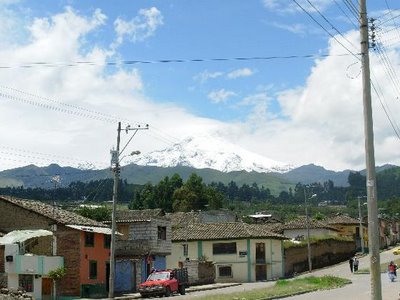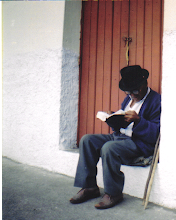
Otro testamento
Se sentó en la entrada de su casa con un libro muy cerca de su cara. Lo habíamos visto en las calles, esforzándose a caminar con dos bastones, uno por mano. El artritis en sus rodillas había de ser horrible. También, hubo algo familiar acerca del libro que leía. Aunque el título en la tapa azul hubo perdido el color, su grosor y tamaño me recordaron de un ejemplar viejo del Libro de Mormón.
Pero el enfoque del hombre mientras leía me hizo dudar que fuera el Libro de Mormón. Nunca lo vimos al hombre en la iglesia, y las personas mayores de Cayambe normalmente no les hablaban a Mormones, ni tampoco aceptaban ni leín uno de nuestros libros.
"Élder Pankratz," dijo mi compañero, "pienso que lee el Libro de Mormón."
"Sí, hablémosle," dije.
Ni se movió cuando le saludamos. Pero cuando nos miró, me pregunté como nos podría ver. Cataratas gruesas cubrieron la mayoría de sus ojos, y usó un pedaso de cuerda para sujetar un par de anteojos rotos con lentes gruesas y monturas negras. Mas tuvimos razón: leía de Mosíah.
"¿Disfruta usted el libro que lee?" le pregunté.
"¿Qué?" dijo el hombre viejo.
"¿Disfruta usted el libro que lee?" le pregunté, tratando de no gritar.
"El libro habla de Dios, y me gusta," contestó.
"El libro es de nuestra iglesia," dije.
"¿Qué?"
"El libro es de nuestra iglesia," dije, trantando de no gritar, "y nos gustaría hablar con usted acerca de lo que enseña."
"Joven, soy miembro de la Iglesia Católica Apostólica Romana. Me nací Católico y moriré Católico."
Tratamos de hablarle más, pero o no nos pudo oír o no nos hizo caso. Salimos, y volvió a su lectura con el mismo enfoque de antes.
Hay días cuando me pregunto si nosotros, como miembros de la Iglesia, somos como aquel hombre viejo. Aceptamos que el Libro de Mormón es la palabra de Dios, pero no reconocemos la plenitud que el libro nos ofrece.
La invitacion
Como misionero, mis visitas primeras con investigadores siempre terminaron al leer con ellos la promesa que se da por Moroni. (Véase Moroni 10:3-5). Quería tanto que ellos supieran que el Libro de Mormón es verdadero. Es verdad que esa promesa es esencial en obtener un testimonio del Libro de Mormón, yo quisiera que yo les hubiera enseñado más sobre la invitación que Cristo dio a los habitantes de América antigua cuando se les apareció porque saber que el Libro de Mormón es verdadero es sólo un paso en conocerle a Jesús. En el templo de la tierra de Abundancia, Jesús dijo:
Levantaos y venid a mí, para que metáis vuestras manos en mi costado, y para que también palpéis las marcas de los clavos en mis manos y en mis pies, a fin de que sepáis que soy el Dios de Israel, y el Dios de toda la tierra, y que he sido muerto por los pecados del mundo.
Uno por uno, cada persona vino a Jesús y recibió un testimonio perfecto de la divinidad y
el amor redentor de Jesús. (3 Nefi 11:14-15.)
La invitación de Cristo no fue solamente para los Nefitas y Lamanitas. Se nos extiende hoy. Pero solamente podemos contestarla por el Libro de Mormón.
Ayudado a aceptar
Mis padres me ayudaron a aceptar la invitación de Jesús cuando yo tenío ocho años, pero no porque yo era un niño angélico. Después de muchas amenanzas que yo iba a matárme o que yo iba a escaparme de la casa o que yo odié a todos, mis padres no sabían que hacer. Llegó al punto que mi padre me dijo que el dudaba si yo estuviera listo para bautizarme.
Sin embargo me bauticé aún que no cambié mi comportamiento. Y después de tiempo mi padres me compraron mi propio Libro de Mormón. No me acuerdo por que, pero empecé de leerlo, y se hicieron cambios con mi comportamiento.
Palpando las marcas
Mas importante que la manera que cambió mi comportamiento, el Libro de Mormón me trajo a Jesús y me dio un testimonio perfecto que el es mi Salvador. Pero mi testimonio de Cristo no me vino de una manera tan dramática como lo de los Nefitas y Lamanitas. Como un niño de nueve años, no entendía mucho de lo que leí, pero los cuentos del Libro de Mormón me encantaban: cuando Nefi obtuvo las planchas de bronce (1 Nefi 4), cuando Ammón salvó los rebaños del Rey Lamoni (Alma 17), cuando Enós oró todo el día y la noche (Enos 1), y cuando el Capitán Moroni defendiendo la libertad con toda su fuerza (Alma 43-62). Pero mi cuento favorito era cuando Jesús sanó a los enfermos y bendijo los niños al templo de la tierra de Abundancia. (Nephi 17). Pero no me di cuenta que Cristo había empezado bendiciéndome y sanándome a mi.
Como joven, lloré con Jesús cuando contrasté la manera que los Nefitas y Lamanitas trataron a Jesús con la manera que los Judíos lo trataron. En Jerusalén, la mayoría de la gente le le rechazó, pero en Abundancia, todos lloraron cuando pensaron que Jesús se iba. En Jerusalén, Jesús probó el rechazo y el odio de los que anhelaba sanar. Quisás sintiera que su sacrificio fue en vano. En Abundancia, todos se regocijaron y vinieron a Él. Y su gozo fue completo cuando vio que su sacrificio los hubo salvado a tantos. (3 Nephi 17:20 ).
Al continuar leyendo, el Libro de Mormón me enseño la doctrina de la expiación, y mi amor para Jesús creció. Por el libro, sentí el amor perfecto de Dios que le mandara a su Hijo Unigénito a sacrificarse por nosotros y el amor de Jesús que el descendiera debajo de todo para alzarme a la vida eterna. Reconocí que Jesús satisfizo "las demandas de la ley" (2 Nephi 2:5, 10) por mi cuando el bebió "la copa de la ira de Dios" y sufrió las penas de los condenados (Mosíah 3:25-27). Me salvó a fin de que yo no nesecitara sufrir lo mismo, y anhelé "ser recibido el los brazos de Jesús" (Mormón 5:11).
Y aprendí mi responsibilidad en el Plan de Salvación. Yo nesecitara "fe para arrepentimiento"(Alma 34:17). Y si no me arrepintiera, Jesús no podría salvarme "porque a menos que fuera por [las condiciones del arrepentimiento], la misericordia no podría surtir efecto, salvo que destruyese la obra de la justicia" (Alma 42:13). Y el arrepentimiento llegó a ser más que dejar de hacer cosas malas; llegó a ser la manera por la que mi voluntad podría ser "absorbida el la voluntad del Padre" (Mosíah 15:7) para que yo pudiera "[seguirle a Cristo y hacer] las cosas que [hube] visto [Jesús] hacer" (2 Nefi 31:12), incluyendo ser bautizado, recibir el Espíritu Santo, y obedecer los mandamientos del Padre. Sin esa sumisión, Jesús no tendría poder "para redimir[me] [a mi] de [mis] pecados" (Helaman 5:11) porque Él no me forzara recibir la salvación (Alma 42:17).
De veras, Jesús ha satisfecho "las demandas de la ley, por todos los de corazón quebrantado y de espíritu contrito" (2 Nephi 2:7). Y no hay "otro nombre, niotra senda ni medio, por el cual la salvación llegue a los hijos de los hombres" (Mosíah 3:17). Cristo ya pagó el precio del pecado y nos salvará si le permitimos.
Hoy, es una maravilla que Jesús no sólo sufriera por mis pecados pero por mis "dolores, aflicciones y tentacions . . . ; [y mis] enfermedades . . . , a fin de que según la carne sepa cómo socorrer[me] [a mi] de acuerdo con [mis] enfermedades" (Alma 7:11-12). No comprendo que, mientras sufro, no sufro solo. Testifico que Jesús nos socorrerá. He tenido experiencias demasiadas numerosas y sagradas para mencionar cuand, después de sentir listo de entregarme a las pruebas y aflicciones de la vida, Jesús me consoló y me susurró que todo saldría bien.
Sé que Jesucristo vive y es el Salvador de mi alma. A pesar de que no lo he visto, espero el día cuando me arrodillé delante de Él. Pero por el Libro de Mormón, yo ya lo conozco. Si el velo se partiera hoy y yo le metiera la mano en su costado y palpara las marcas de los clavos en sus manos y pies, no sabría mejor que ya sé que Jesús es el Cristo, el Hijo del Dios viviente porque yo he palpado, de una manera muy real, las señales de su expiación por las enseñanzas del Libro de Mormón.
Levantaos y venid
Y todos pueden conocerle a Jesucristo en una manera poderosa y perfecta. La invitación que Jesús les puso a los Nefitas y Lamanitas se nos extiende hoy. Pero tenemos que contestarla. Debemos "[sacudirnos] de las cadenas con las cuales [estamos] sujetos, [aún las cadenas del pecado], y [salir] de la obscuridad, y [levantarnos] del polvo" (2 Nefi 1:23).Y tenemos el Libro de Mormón y su plenitud para ayudarnos. ¿Lo leerás y lo escrudriñarás para encontrar la plenitud que contiene? Si lo haces, testifico que lo encontrarás a Jesús esperando "con brazos abiertos para recibirte" (Mormón 6:17). Él te conoce. "Él ha llevado [tus] pesares y sufrido [tus] dolores . . . ; y con sus llagas [puedes ser] sanado" (Mosíah 14:4-5).
A pesar de que aquel hombre viejo en Cayambe no nos escuchó, él contestaba la llamada de Jesús, y no me preocupo mucho por él. Cualquier persona que lee el Libro de Mormón con la misma energía y enfoque como el hombre viejo recibirá todas las bendiciones que el libro ofrece. Tal vez, después de morir, el hombre viejo y yo nos encontraremos otra vez y nos regocijaremos mientras compartimos uno con otro nuestro amor por el Libro de Mormón porque nos habrá traído a Jesús.



